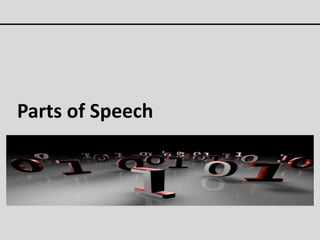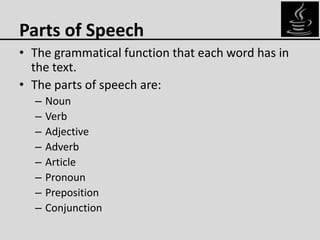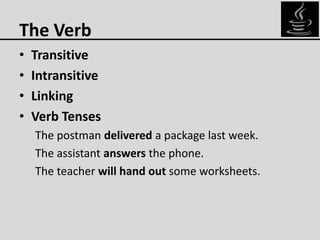Parts of speech
- 2. Parts of Speech • The grammatical function that each word has in the text. • The parts of speech are: – Noun – Verb – Adjective – Adverb – Article – Pronoun – Preposition – Conjunction
- 3. The Noun • A noun is a word used to name a person, animal, place, thing, and abstract idea. Late last year our neighbors bought a goat. The bus inspector looked at all the passengers' passes.
- 4. The Noun • Noun Gender Female or Male • Noun Number Singular or Plural • Possessive Nouns The red suitcase is Cassandra's. The miner's face was covered in coal dust.
- 5. The Noun • Proper Nouns Canada is a large country. • Concrete The stone is on the road. • Abstract Justice often seems to slip out of our grasp.
- 6. The Noun • Countable We painted the table red and the chairs blue. • Non-countable Oxygen is essential to human life. • Collective Nouns The flock of geese spends most of its time in the pasture.
- 7. The Verb • The verb is perhaps the most important part of the sentence. A verb or compound verb asserts something about the subject of the sentence and express actions, events, or states of being. The verb or compound verb is the critical element of the predicate of a sentence. The guitar player hasn’t tuned the guitar. The guitar is not tuned.
- 8. The Verb • Transitive • Intransitive • Linking • Verb Tenses The postman delivered a package last week. The assistant answers the phone. The teacher will hand out some worksheets.
- 9. The Adjective • An adjective modifies a noun or a pronoun by describing, identifying, or quantifying words. An adjective usually precedes the noun or the pronoun which it modifies. They bought a beautiful chair.
- 10. The Adjective • Possessive Adjectives Her dog is a Chihuahua. • Demonstrative Adjectives They brought those books. • Interrogative Adjectives Whose car is that? • Indefinite Adjectives Some people enjoy this park.
- 11. The Adverb • An adverb can modify a verb, an adjective, another adverb. The girl walks slowly. They are very selfish. He sings very passionately.
- 12. The Article • An article is a word that combines with a noun to indicate the type of reference being made by the noun. • Indefinite Article A university was founded last year. An honest man must take that position. • Definite Article The people in this neighborhood are very happy.
- 13. The Pronoun Subject Object Possessive Reflexive Other I You He She It We They Me You Him Her It Us Them Mine Yours His Hers Its Ours Theirs Myself Yourself Yourselves Himself Herself Itself Ourselves Themselves Demonstrative This makes the process easier. Interrogative Who called? Relative The chair which you bought is nice. Indefinite Something happened A pronoun can replace a noun or another pronoun.
- 14. The Preposition • A preposition links nouns, pronouns and phrases to other words in a sentence. The word or phrase that the preposition introduces is called the object of the preposition. About Above Across After Against Along Among Around At Before Behind Below Beneath Beside Between Beyond But By Despite Down During Except For From In Inside Into Like Near Of Off On Onto Out Outside Past Since Through Over Throughout Till To Toward Under Underneath Until Up Upon With Within Without
- 15. The Conjunction • You can use a conjunction to link words, phrases, and clauses • Coordinating He is kind but clumsy. • Subordinating I would buy a new house if I won the lottery. • Correlative Bring either a salad or a potato scallop.














